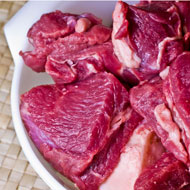Non-stun petition hits target

A new FSA survey has revealed a rise in the number of animals slaughtered without pre-stunning.
A petition urging the government to ban animal slaughter without pre-stunning has reached its target of 100,000 signatures. The issue may now be debated in the House of Commons.
The BVA, who launched the petition just nine months ago, said it was a significant step on the road to banning non-stun slaughter and shows the strong public support for the campaign.
The news was announced yesterday (January 29), on the same day the Food Standards Agency (FSA) revealed there has been a rise in the number of animals slaughtered without pre-stunning to render them insensible to pain.
Since 2011, the UK has seen a 31 per cent increase in the number of cattle not stunned before slaughter for Halal meat, according to the FSA's animal welfare survey of slaughterhouses.
Figures also show a 56 per cent rise in the number of sheep and goats that were not pre-stunned before slaughter for Halal.
There was, however, a small decrease of 1.7 per cent in the number of poultry not pre-stunned.
Kosher (Shechita or non-stunned slaughter) was also found to be in decline, falling by 66 per cent in cattle, 68 per cent in sheep and goats and 69 per cent in poultry.
The figures are based on assessments carried out by official veterinarians from September 16-30, 2013, at 232 red meat slaughterhouses. Overall, the figures show 2 per cent of cattle, 10 per cent of sheep and goats and 4 per cent of poultry were not stunned before slaughter in the UK.
BVA is now urging the Backbench Business Committee to honour the e-petition and call a House of Commons debate at the earliest opportunity. It will still be possible to sign the petition until March 30.



 The latest
The latest